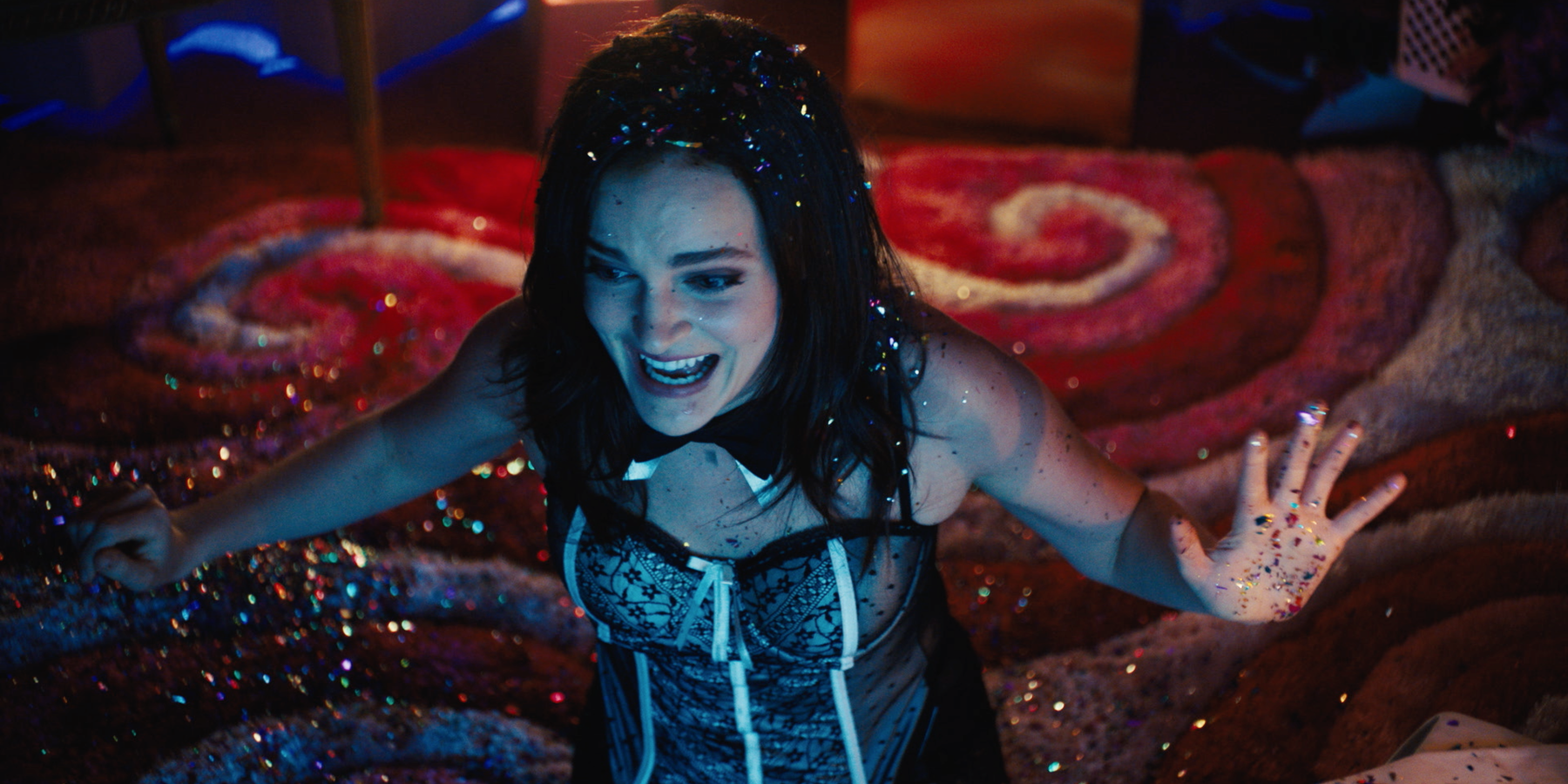
The rules of Isa Mazzei and Daniel Goldhaber's Cam — which tells the story of Alice, an entrepreneurial camgirl who has her identity hijacked by an online algorithm — go like this:
Nothing bad happens to Alice because of her choice to engage in sex work. The story is told entirely from Alice's perspective. Alice is never positioned as a tragic victim or an invulnerable femme fatale. Alice has control over her work and her world. When she loses it to a cyber foe — a deep-fake of herself — the film doesn't unravel into a cautionary tale, but rather, reveals itself as a story about a woman's terrifyng, triumphant battle for her agency.
Mazzei was strict about these guidelines while writing Cam because sex workers are typically disposable bodies in horror. Girls like Alice are first kills, equally thoughtless for the killer and the audience, that help carry the plot along until a more respectable victim goes missing. Girls who survive in horror traditionally have to be perceived as innocent, and in our society, sex workers aren't.
Mazzei, a former camgirl, is all too familiar with these tropes. She set out to create "a sex worker that you're not going to expect." To do it, she teamed up with Blumhouse, the production company behind many of horror's most innovative recent films, including Get Out, Insidious, The Purge and Sinister.
Alice, brought to life by Madeline Brewer (Handmaid's Tale, Orange Is The New Black), was inspired by the protagonists of films about the pursuit of perfection in art, says Mazzei, like Whiplash and Black Swan. Camming is Alice's whole world. The film takes us deep inside this remarkable universe, taking place mostly in the the pink plush, immaculate room where she livestreams meticulous seductions, from a kinky BDSM suicide routine, to a wine-and-steak date night, for a chatroom of tipping, adoring viewers.
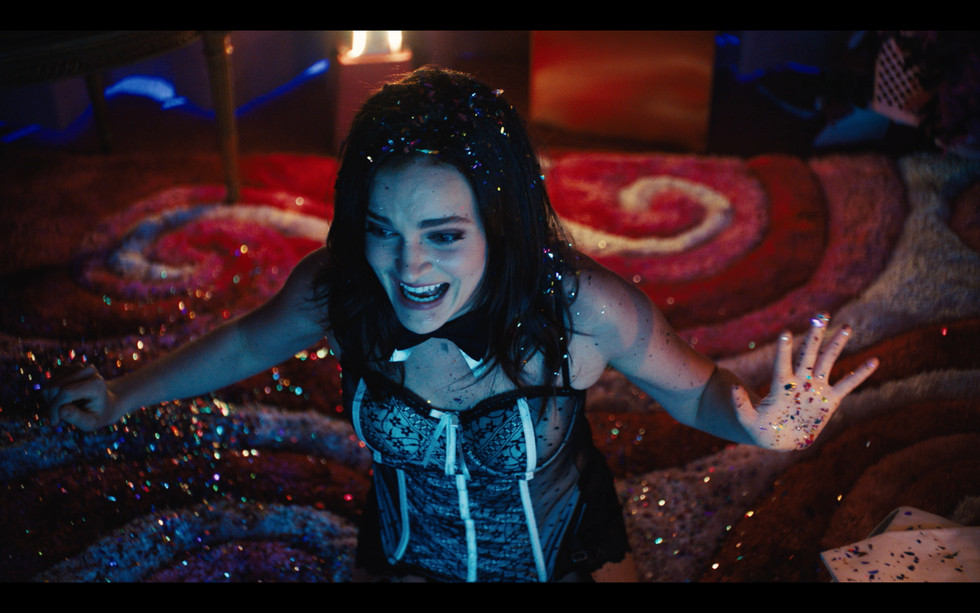
One day, Alice finds herself locked out of her FreeGirlsLive.com account, on which a demonic deepfake has started performing shows of its own accord. Fans don't know the difference. Her terror is poignant. When we live such full lives online, we have a lot to lose.
Mazzei's script and Goldhaber's directing knot these fears together into a gruesome fable that invokes a number of topical monsters — influencer culture, cybersecurity, male desire — and none of them are sex work or women's sexuality. Rather, they exploit our expectations of a film of sex work, yanking the rug out from under the viewer again and again.
PAPER spoke with Mazzei about her own experiences camming, creating Alice's world, and how she got a film like this through Hollywood.
What made you want to make a horror movie around these subjects?
The idea, first and foremost, was to tell a story where an audience would empathize with a sex worker. That was before I knew that I wanted it to be a genre film. So, originally, I thought about maybe doing a documentary. But ultimately what I love about horror is that it's a place where we talk about subversive topics. It's a place where we can explore other ideas, and it's also a genre that people love. So I thought it would be the perfect medium because when you're in a thriller or a horror, you're so immersed in the thrill of it, that sometimes you aren't immediately thinking about the politics behind it. So I think that by getting an audience inside Alice's head and having them root for Alice, they're empathizing with a sex worker in a way that's actually pretty subversive.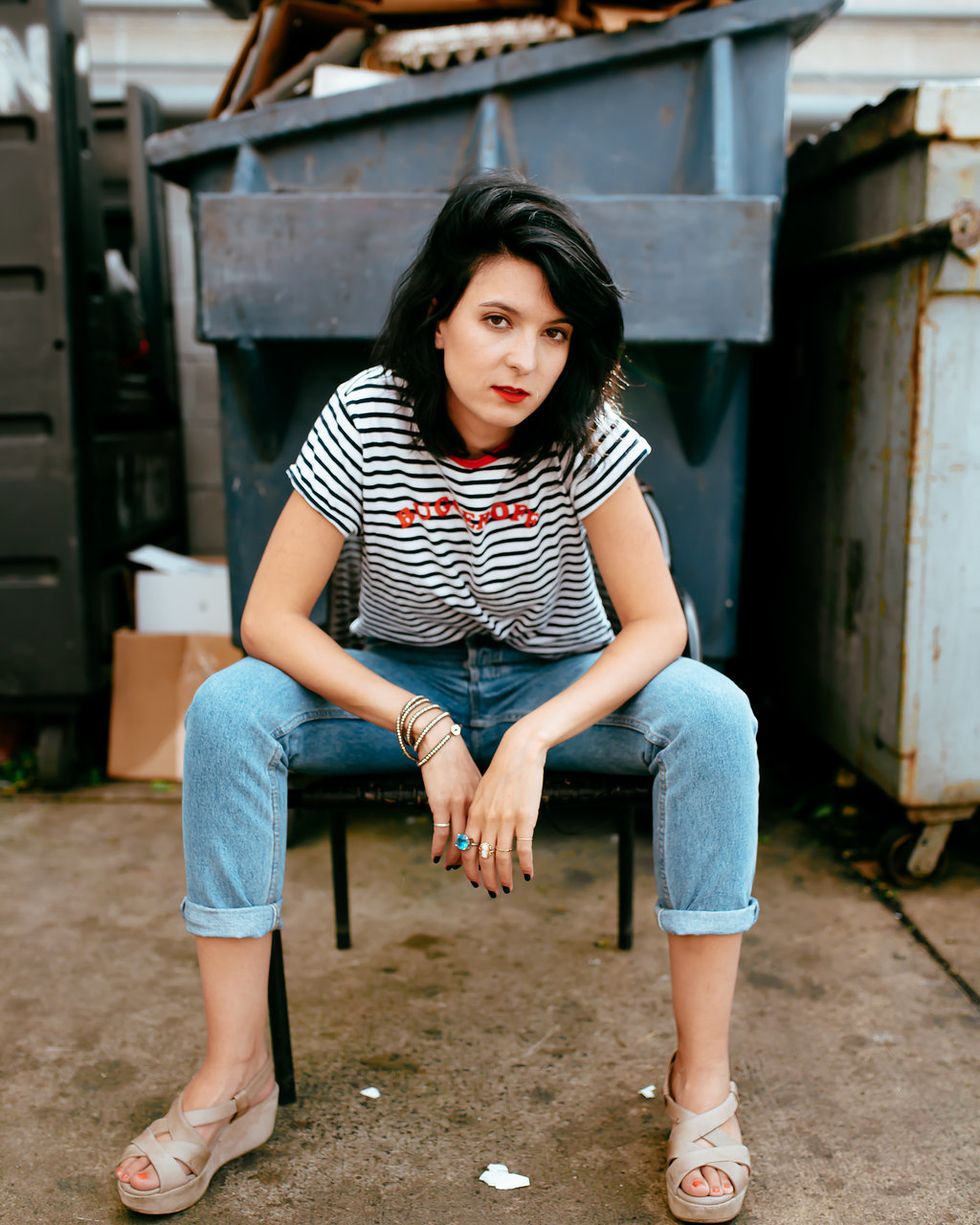
Isa Mazzei
Using a genre where the emotions run so strong, you're able to get audience out of "this is a film about a camgirl." That really makes a lot of sense as a strategic move to tell the kind of story.
Totally. The movie is scary because Alice loses agency. And it's only scary if you recognize that in the first thirty minutes of the film, she has agency and control, which is often not a characterization that we give to sex workers.
Especially in horror where sex workers are historically just collateral damage.
Absolutely. I totally wanted to subvert the expectation there. Because so often in horror, sex workers are disposable objects that are used to further a plot or, exactly, as the first kill, or as the kill that somehow matters less because it's a sex worker and not another type of person. That's so damaging and wrong to do.
Cam watches like a laundry list of our biggest fears today: technology, sex, influencer culture, online identity, cybersecurity.
First and foremost this is a movie about digital identity, and that is relatable to anyone that has an online presence. What we're relating to is this loss of agency and this loss of control over our digital personas, and I think we all can relate to that. Alice deals with so many scary things in the film, from being outed to her friends and family who judge her for it, and then dealing with the police not taking her seriously and harassing her — those are all things that are a direct consequence of how we stigmatize sex work.
"What I love about horror is that it's a place where we talk about subversive topics."
What did you want to position as the "real" monster in the film?
Fundamentally, the most terrifying part for Alice is watching this person that looks exactly like her, that's not her, run away with something that she cares about. That comes from this literal anxiety I had while I was camming about where do I end, and where does my persona begin? Do my online friends like me, or do they just like the persona that I've created? And I did consider my viewers my genuine friends, so what did that even mean when they were interacting with just this version of me instead of actually me?
It also came from a place of having my shows pirated and stripped of all identifying information about me and then re-uploaded all over the internet without my consent. To have work that for me was my career, my passion, and my art and labeled, like, "Frizzy Haired Hottie" and put on Pornhub was really this disembodied experience of watching myself that was in no way tied to me anymore. I definitely took a lot of inspiration from that into Lola and this experience that Alice has.
I think that's the lesson that Alice learns at the end. She learns how to separate herself from this digital performance. She's embraced this world of makeup and performance that she was maybe rejecting in the beginning, and now she's fully different when she's online than when she's offline. This separation of self and digital self is really the point.
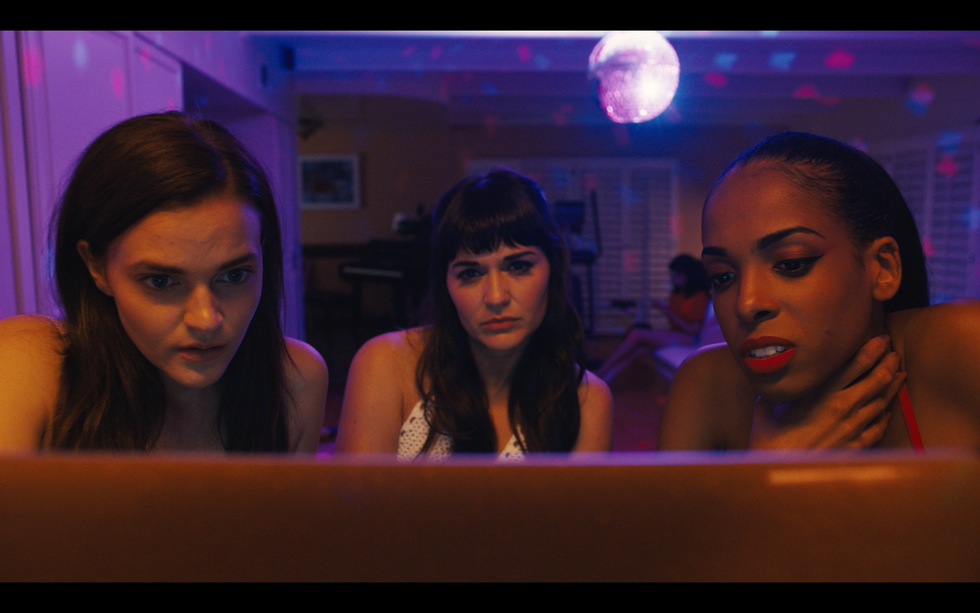
What exactly happens with the doppelgänger is left slightly ambiguous. What was your intention in leaving some room for the imagination there?
There are so many things on the Internet that we don't know how they work. We don't know how the Facebook algorithm works, but we just kind of accept it, and we interact with it, and we interface with it. And there is something very terrifying in that. And I think that for Alice, she doesn't ultimately need all the answers, she just needs to know how to get her shit back. And I didn't want to distract from Alice's journey by giving away too much and delving too much into this backstory of Lola. So it was really intentional to give the audience enough of a clue that they can figure out for themselves, but not dive into it too much and be distracting.
Related | Abusive Deepfake A.I. Porn Is Technically Legal
Another thing that came out actually while our film was in post was Deepfake. Deepfake is essentially software that you can use to put anyone's face on anyone else's body. So for example, you can create porn of someone that never did porn, anyone you want, a celebrity, whoever. And what's terrifying is that it absolutely looks real. That's the age that we're living in. That's where our technology has gotten us. So in a way, that's how Lola is. She is something that now, actually, already exists, and we have to figure out how to grapple with that.
It felt very significant that Lola goes back to camming at the end. I think if she didn't, it would've felt a little bit like a cautionary tale.
Whiplash and Black Swan are two movies that I looked to a lot while writing this script. In both of those movies, we have protagonists that have overwhelming passion and drive for something in their field. And they go to the end of the earth to perform their art. You know, Miles Teller, his hands are bleeding, and he's drumming, and he's bruised, and he's battered; Natalie Portman literally dies to perform this role. And we never question that. We never question their drive and their ambition and their passion, because we just understand inherently that this is their art and that this is their creative expression.
It was very important for me to mirror that in Alice. This is her art, this is her creative expression, this is where she thrives. Regardless of the risks that come with that, and regardless of what she goes through to get that back, at the end of the day, it's absolutely imperative that she goes back to her show, because this is what she loves to do. And that doesn't mean it comes without problems, just like in Black Swan or in Whiplash, but her passion itself and this career that she's chosen are what's right for her. So for me, it was actually never negotiable that she go back, she absolutely had to go back. We met with financiers who wanted alternate endings. They wanted this cautionary tale, and that was a deal breaker for us. We knew going in that she would go back and that we wouldn't move on that.
"It turned out that agents weren't sending this script to their clients because they were scared of it."
Was it difficult to get a film like this made in Hollywood?
I mean, it was difficult to find the right partners, but once we found them, it was actually incredibly — well it wasn't incredibly easily — but I would say it was definitely easier. Once we partnered with Blumhouse, and they put us in touch with Divide/Conquer and our producer Adam Hendricks, they understood the vision behind the film. They understood the politics behind the film. They understood what we wanted to do. They had just finished Get Out, so they kind of knew that there was a demand for these sociopolitical genre films, and they were really excited about that. It was a lot of our crew members' first film. It was our DQ's 15:33 first film, our composer's first film, a lot of people's first film. But everyone that wanted to work on it was really passionate about it and really understood the vision behind it, which was really cool.
Once we had the right team behind the film, it was great...but that's not to say we didn't butt-up against problems. I would say the only thing that was really hard was casting, especially the lead. Usually when you cast a film, you send the script out to agencies, and agents send it out to their clients. And we sent the script out, and we waited, and we would hear back from agencies, "Oh, my clients have passed, they passed, they passed." And then Daniel or I would be at a party, or at some sort of event, and we would meet an actress that we had sent the script to, and we would say, "Oh, this is our movie," and talk to her about it, and she would say, "Oh, that sounds so cool, I wish I had been sent that script," and we would say, "Oh, but we did send you the script." And it turned out that agents weren't sending this script to their clients because they were scared of it. They were scared to send it out.
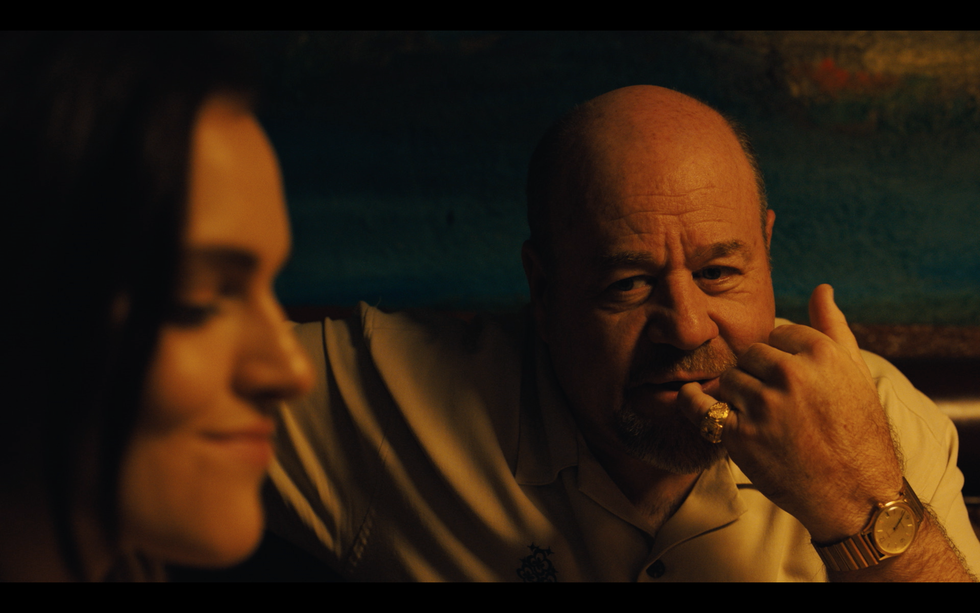
How did you find Madeline Brewer (Alice)?
We realized we were going to have to do it on our own. Danny's dad actually found her. We worked a lot at Danny's parents' house, and his dad came into the room, and he's a physicist, he's in no way a filmmaker, but he came in, and he said, "We found your lead." And we're like, "No you haven't, Steve, go away," and he was like, "No, no, no, I found your lead, I just watched her in a Black Mirror episode, her name is Madeline Brewer." This is before Handmaid's came out, and we watched her, and we were like, "Oh my God, she's so good."
She read the script and we talked for a long time and she loved it. We knew right away that she was absolutely perfect for the role. And it's a crazy demanding role. She's playing four different versions of herself. She's on screen literally the entire film. She said two things to me that I think are so cool. The first thing she said is, she said that she "would be honored to play a sex worker," which meant so much to me having experienced all that I did trying to sell this film, to have an actress say, "I would feel honored to play a sex worker," was really moving. And then from an acting perspective, she was like, "I'm stoked to play four different characters in one movie. This is hard, this is an acting challenge, and I'm so excited about what this could mean for me as an artist." So I thought that was really cool, too, because she recognized both how important the film was to us personally, but also what it meant technically, and how demanding that was. And I think she crushed it. Her performance is absolutely mind blowing.
This is such a unique portrayal of a sex worker. How did you approach balancing the cliches of the all-empowered femme fatale bad-ass bitch sex worker, who's getting her paper, and a helpless, pathetic victim?
When I was a sex worker, I would tell people that I met that I was in porn, and they would always look at me and say, "But you're so normal." That was the most common response I got. "You're so normal." And just confusion. And I'm like, "Yeah, what did you expect?" They would say, "You're so normal," or, "Do you really need money that bad?" or, "Wait, but you went to college, you're too smart to be doing this."
Even some of my viewers would say things like that to me. They would try to save me from the thing they were consuming, which is entirely problematic. It was really important for me to show Alice as a sex worker that you're not going to expect. Yes, she has a nice house and she makes a good living, but at the end of the day, she's living in a small town, she's still hanging out with her family, she's doing kind of unconventional shows, she's engaging with the psychology of her viewers and seeing how far they'll go.
So, it's an unconventional type of sex work that we're portraying. And that's another reason I show her calendar, and her writing down how many tokens or tips she gets, which night, what type of show you're going to do. Because that's what it's like when you're a cam girl. You're thinking, okay, what nights am I going to do which type of shows, how many viewers am I going to get if I do this and this, and it is really calculated like that. And I think, again, there's this misconception that if you just take off your clothes, you'll make a bunch of money, and that's not what it's like at all. It is a business. So it was important for me to show that type of sex worker that I don't think I've seen before. I think Alice, at the end of the day, is a girl that could very easily be your best friend. And I think that was really important for me to get across.
How did you build Lola's camming world? It felt so vibrant and fleshy and real.
The cam site that we built is based on real cam sites. We really wanted the camming interactions to feel real, the tips to feel real, the tip noises to feel real, and the hyper-simulations to feel real, because that's really what it's like when you're camming. You're in front of a webcam, and you are just alone in a room screaming at your computer, but you're also engaging with thousands of people at the same time.
So we really wanted that to feel as authentic as possible. We actually built a live site for Maddie, and all of those chats are actually scripted, and they are all cohesive, and all of the men in her chatroom have characters and have personalities and have inside jokes with each other. Not only to get Madeline's improv-ed reactions to these jokes and these moments, but also to make sure that, like, her eye lines were right. Because when you're camming, you go from looking at your ranks, to looking at yourself, to looking at your chatroom, to looking at your messages, to looking at yourself again. And so we really wanted her to be able to have that authentic experience of watching herself and performing in this way, so it was really important to shoot all those screens live and have this actual, functional site.
I think that some of the other spaces, like Alice's pink room and cam girl clubhouse —you know, cam girls do curate their spaces and there are houses where cam girls live together, but ultimately those are both kind of fantasy spaces that are very rich and saturated versions of what they might be in real life. We wanted Alice's camera space, this pink room, to feel so rich and luscious. Like, this is the space where she goes to create. And her real life, outside, she hasn't even un-boxed her furniture. She's got, like, take-out containers everywhere. Because that's not where she's putting her energy, that's not where her focus is.
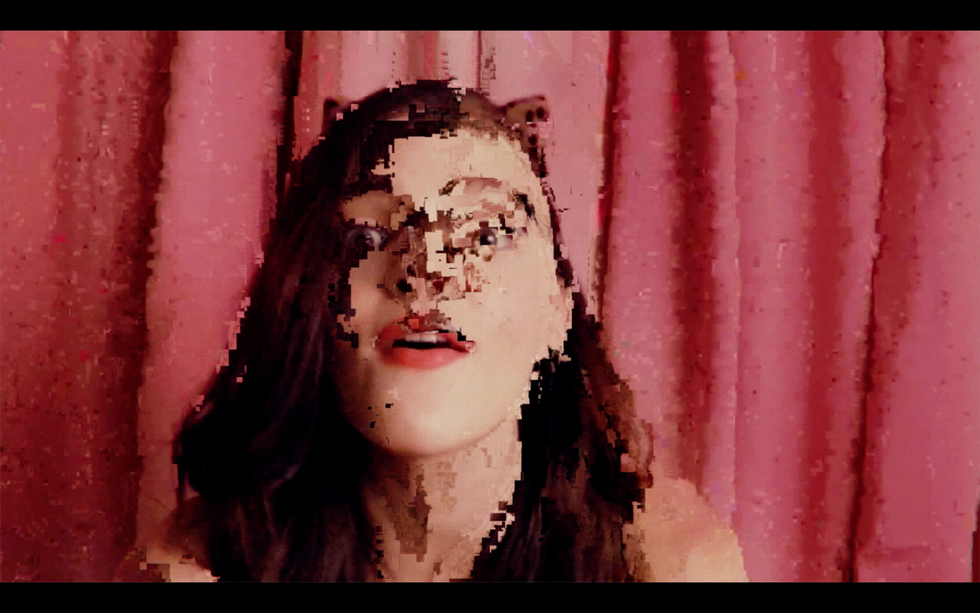
Did things start to go wrong because of how obsessed Alice is getting about her rankings, as some kind of commentary on losing yourself in online celebrity?
It was actually really important to us that we never derive a negative face of the film from the protagonist trying to engage in sex work. So, the idea that she's copied, there's a line from Tinker, like, she's not the only girl that gets copied, and it's never her fault. At the end of the day, when Alice goes back, she has created this separation between herself and her digital self that maybe didn't exist in the beginning of the film. When she's clicking to go back on, it says, "You're number 167,000" or whatever. To me, that's indicative that her ambition is still there, she's looking at that number as a challenge, and she's ready to climb back up the ranks again, because that's what she loves.
Do you see yourself continuing to work in horror?
Daniel and I have another film in development together with Blumhouse, it's another female-led horror/thriller, with the same kind of co-authorship that we did on this film. I also have a book coming out next year that I'm really excited about, it comes out November 2019, and it is a memoir about the time I spent as a cam girl, and I hope that I can continue doing some of the work that I was trying to do with this film in helping people engage with a sex worker and understand the industry more, and hopefully work to de-stigmatize that.
Photos via Blumhouse Productions
From Your Site Articles